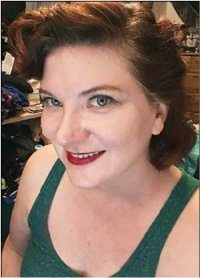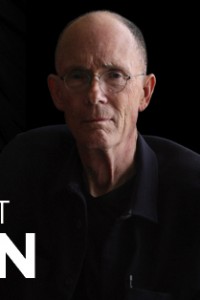Nnedi Okorafor: That Which Is Hers

Nnedimma Nkemdili Okorafor was born April 8, 1974 in Cincinnati OH to Igbo parents who emigrated from Nigeria in 1969. She earned a BA in rhetoric at the University of Illinois in 1996 and an MA in journalism from Michigan State University in 1999. She attended the University of Chicago, getting her MA in English in 2002 and completing her PhD in 2007. She attended the Clarion writing workshop in 2001.
Okorafor is an author primarily of Africanfuturist and Africanjujuist literature. Her first SF story, “The Palm Tree Bandit”, appeared in 2001, and story “Windseekers” was included in a Writers of the Future anthology that same year. Since then her stories have appeared in various anthologies, and some of her short work was collected in Kabu Kabu (2013). Her Binti novella trilogy is Hugo and Nebula Award winner Binti (2015) and Hugo Award finalists Binti: Home (2015) and Binti: The Night Masquerade (2018). New novella Remote Control came out in January 2021.
Her debut novel was YA Zahrah the Windseeker (2005), and YA The Shadow Speaker (2007) was also her PhD dissertation. Who Fears Death (2010), her first adult novel, won the World Fantasy Award and was a Tiptree Award honor book and Nebula Award finalist. Prequel The Book of Phoenix appeared in 2015 and was a Clarke Award finalist. YA Akata Witch (2011) was an Andre Norton Award finalist, and Lodestar Award winning sequel Akata Warrior came out in 2017. Adult novel Lagoon appeared in (2014). Her latest novel is YA Ikenga (2020). Noor, set in the world of Remote Control is forthcoming.
Okorafor also writes critical essays and has been a newspaper columnist. Her comics work includes titles for Marvel, Hugo Award winning original graphic novel LaGuardia (2018), and graphic novel After the Rain (2021), adapting her story of the same name. In recent years she has begun to write screenplays: she is adapting Octavia E. Butler’s novel Wild Seed as a series for Amazon, and is also working on adaptations of her own work, including the Binti series and Who Fears Death. Her memoir Broken Places & Outer Spaces: Finding Creativity in the Unexpected appeared in 2019.
Okorafor has taught at Chicago State University and Governors State University, the University of Buffalo. She recently relocated from Chicago IL to Arizona, where her daughter Anyaugo Okorafor-Mbachu lives.
Excerpts from the interview:
“Arizona is wonderful. I hate cold weather, and I’ve always whined about it for years. I grew up in the Chicago area, the south suburbs, so I’ve always had to deal with winter and I’ve always said I want to get away from winter. This time I just took the plunge, because my daughter got into Arizona State University. That’s what I needed – that was the push. We moved basically in the middle of a pandemic, which was fun and stressful and weird, but also refreshing in a way, because for me, with the pandemic, I had everything that I needed inside. In my condo, I had my indoor gym, treadmill, weights, pull-up bar, all of that. I brought it all, because I used to go to the gym and then I stopped. Then of course I write my books and all of my stories at my workstation inside, and my daughter was doing all the shopping. It was getting a little crazy. I don’t like the cold, so winter came and I wasn’t going outside at all – I could go a whole week without going outside and I’d be fine. That was starting to worry me a little bit. Since we moved here, I’ve been outside so much, and it’s been this weird shock to my system. I can’t figure it out. Sometimes I breathe differently when I’m outside.
“Living here might affect my writing, because now I’m in a place where there are all of these different creatures. I’m always in tune with the creatures around me. When I was in Illinois, I knew all the creatures, and I was totally into everything. All the owls that would come by, I knew where they were, and I would tweet about them – all of the sparrows, the starlings, all of that. Now I’m in this place where there are all these different types of creatures. There are scorpions here. It’s a completely different type of everything – different seasons, too. I know that’s going to show up in my work.
“I have been writing about Sankofa, the main character in Remote Control, for a decade, or maybe more. It took me six years to write Remote Control, to get the story where it needed to be – at one point it was a full novel. Even before Remote Control, I was writing about Sankofa in a different book, so I know her well. There are big things about her that didn’t even make it into Remote Control. My second novel was The Shadow Speaker, and I wrote a sequel – that’s where I discovered the character. I thought she was so interesting, and I wanted to learn more about her. That’s what led to Remote Control. In my stories, it’s always the characters that come to me first. Then the characters exist in a world, and I look at the world through the character’s eyes. I don’t outline, so I just start writing, and I started writing about this girl. I discovered her name was actually Fatima, and then her world came to me more and more. It’s a world I’ve been writing about not just in Remote Control, but in other stories too. The worlds I’m writing are big and they’re alive and there’s so much going on in them. Remote Control takes place in world that I already know really well, that I feel comfortable with, and can move around in and understand very deeply. It’s near-future West Africa. It’s all very fertile.
“The heart of Remote Control is…. It has multiple hearts. There’s Sankofa and what she goes through, what she becomes and what she learns to embrace. That’s one part of the story: her having the strength and the confidence and the clarity to embrace that which is hers. That’s one of the hearts of the story. Another is the world where it takes place, near-future Ghana, but it’s not just Ghana – it’s Wulugu, a suburb of Accra. The setting is very specific. You can name it, you can look at it on a map and see how it’s connected to our world. It’s near future, and it’s very close. That’s another heart of the narrative, that this story is just one of many things happening in this place and time, and that world is amazing and interesting. I always say is isn’t like Westworld, because that future to me is over-structured and dead. A lot of futures are portrayed like that, where everything’s too sleek. The roads are perfect, the cars are futuristic and smooth, nothing has dirt on it – you know. That always annoys me. First of all, I don’t want to live in that future. I want to live in a future where there are plants growing just because those plants wanted to grow there, not because someone planted them specifically for aesthetic reasons. My near future is more like that. You see all the tech, but it’s technology that is very specific to the area.
“You have jelly-tellies, which are these stretchable pieces of gelatin that serve as televisions. They’re screens, and you can stretch them to be the size of the wall or tiny, and they’re durable. I came up with that tech when I thought about all the trips I would take to the villages when I was in Nigeria, where it’s very rough going. There are beautiful houses deep in the forest, like mansions, that people from overseas have built, and they have these huge TVs in there. I’d always wonder, ‘How did you get that TV here in one piece?’ That’s where the idea for the jelly-telly came from. Everyone wants to watch movies and TV, but if there are roads that suffer from water damage or whatever, and things get really bumpy, they’d need some technology that could endure that. That’s one of the hearts of Remote Control as well – the tech is subtle. It’s unassuming. They’re just part of the world. It’s not like, ‘Look at this cool technology. Look at it! Just stop the story and look at it!’ No. You’re in the world, you look around and see these things, and you understand that it’s the future.
“Otherness has always been a theme I’m interested in, partially because that’s what I live – I’m Nigerian-American, I have been paralyzed before, and I have this invisible disability that nobody knows about unless I talk about it. I live with that every day. I have all sorts of ways that I’m othered, but I’ve always been one to embrace those things, as opposed to lamenting the difficulties. At least for me, in my philosophy, there’s no way to be happy in life unless you accept that which is given to you. There’s just no other way. I think I infused Remote Control with a lot of that idea. Sankofa is given this power – actually she takes it. She calls it, and then she takes it, and then it’s terrible, and then she has to face it and figure it out. At a very young age, she decides to embrace her power. That’s incredibly mature. There are adults who are not capable of doing that. It’s a hard thing, especially knowing what this power does, and what it does to her life, and she still embraces it. That’s a big theme of the book.
“After the Rain is just an incredible work. I wrote the story, but I wasn’t very involved in adapting it into a graphic novel. That was the first time I’ve done that, because I tend to be very hands on with everything. This is the first time I’ve let someone else take something I’ve written and adapt it, without me putting my fingers in there too much – though there were little things where I would see a few of the pages and be like, ‘Okay, this specific thing needs to change.’ I’m always really big on the specificity of spiritual representations, so I was a stickler about that. Otherwise, though, I kind of stepped back, and the reason was because I knew I could trust John Jennings. I’ve known John for many years and I know his work, and he knows mine. I knew I could trust him with the adaptation. Most of the time, I know that if I’m not there, things that will go wrong. So that was exciting.”
Interview design and photo by Francesca Myman.
Read the full interview in the May 2021 issue of Locus.
 While you are here, please take a moment to support Locus with a one-time or recurring donation. We rely on reader donations to keep the magazine and site going, and would like to keep the site paywall free, but WE NEED YOUR FINANCIAL SUPPORT to continue quality coverage of the science fiction and fantasy field.
While you are here, please take a moment to support Locus with a one-time or recurring donation. We rely on reader donations to keep the magazine and site going, and would like to keep the site paywall free, but WE NEED YOUR FINANCIAL SUPPORT to continue quality coverage of the science fiction and fantasy field.
©Locus Magazine. Copyrighted material may not be republished without permission of LSFF.








